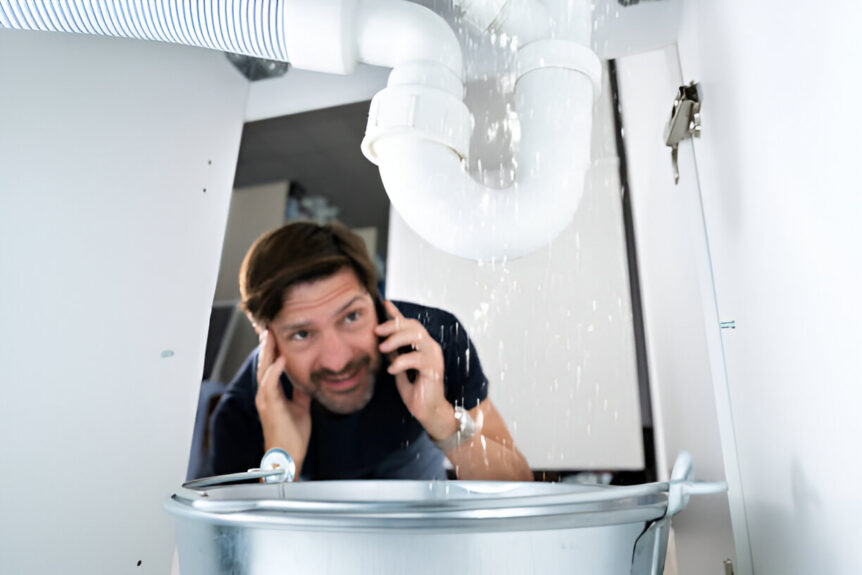Homeowners frequently encounter plumbing problems, which can be expensive to repair. As noted by the Insurance Information Institute, water damage makes up about 24% of all homeowner insurance claims annually. Many homeowners ask, “Does homeowners insurance cover plumbing?” Specifically, they wonder if their policy will cover plumbing damage from a burst pipe or accidental leak, which can lead to costly repairs reaching thousands of dollars. Finding the solution may be challenging, but correcting it could prevent significant financial strain. Knowing what your insurance includes in terms of plumbing is essential for preventing unforeseen costs. Let’s explore the specifics so you’re more equipped for any plumbing issues that may arise.
When Does Homeowners Insurance Cover Plumbing?
-
Accidental Leaks
Unintentional spills from sources such as a malfunctioning water heater or damaged faucet can quickly lead to extensive destruction. If a sudden and unforeseen water leak occurs, your homeowners insurance will probably pay for the water damage and plumbing repairs. It is crucial to take prompt action, as delaying repairs can result in challenges when trying to get your claim authorized.
-
Burst Pipes
Experiencing a burst pipe is one of the most inconvenient plumbing problems a homeowner can face. Extensive damage may occur, damaging walls, floors, and furniture. What’s the positive announcement? Many home insurance policies protect against burst pipe damage unless it results from negligence. If you take care of your pipes and they still burst, your insurance company usually pays for the repairs.
More: What To Do When Your Home Insurance Claim Is Denied Or Delayed?
-
Falling Objects
Although rare, a plumbing catastrophe can be triggered by a large object, such as a tree branch or roof debris, falling on your house. Homeowners insurance usually includes coverage for plumbing damage from falling objects if they result in an inadvertent break in your pipes.
-
Fire or Storm Damage
If a fire or severe storm damages your plumbing system, the repair costs and water damage will usually be covered. This includes pipes that burst due to freezing conditions during a storm, provided you had the heat on and were taking reasonable steps to protect your pipes.
-
Roof Leaks
Your homeowner’s insurance policy can also cover plumbing damage caused by a roof leak. However, this depends on whether the roof leak was sudden and not due to neglect or poor maintenance.
-
Ruptured Appliances
Homeowners insurance will generally cover the repairs if your washing machine, dishwasher, or another household appliance suddenly ruptures and causes water damage. Just be sure the rupture wasn’t due to neglect—routine maintenance is essential to avoid denying your claim. In each of these cases, it’s important to remember that your insurance company will assess the situation based on how the damage occurred. You’ll likely be covered if the event was sudden and accidental. However, if it’s determined that neglect or poor maintenance was involved, your claim may be denied.
What Plumbing Problems Does Homeowners Insurance Not Cover?
Homeowners insurance policies have their limits. While they often cover plumbing issues caused by unexpected events, there are several scenarios where you won’t be so lucky.
-
Gradual Leaks
A slow, gradual leak can cause extensive damage over time, but homeowners insurance doesn’t cover plumbing issues that regular maintenance could have prevented. For example, if a pipe under your sink has been dripping for months and causes mold or structural damage, you’re responsible for those costs. Insurers consider this a preventable issue that should have been addressed earlier.
-
Frozen Pipes in an Unheated Home
Homeowners insurance won’t cover the damage if your pipes freeze and burst because you left your home unheated during winter. To ensure coverage, you need to keep your home adequately heated and take measures to prevent freezing, like insulating pipes.
-
Wear and Tear
Like most things in your home, plumbing systems degrade over time. Homeowners insurance does not cover normal wear and tear, including minor leaks, clogs, or corroded pipes, which are part of routine home maintenance.
-
Negligence
If you ignore warning signs like a minor leak or cracked pipe, your homeowners insurance may deny your claim on the grounds of negligence. Insurers expect homeowners to maintain their property, and failure to do so can void coverage.
-
Sewer or Sump Pump Backups
Most standard homeowners insurance policies do not cover sewer backups or sump pump failures unless you purchase an additional rider or endorsement. These backups can be extremely expensive to fix, so consider adding this coverage if it’s not already part of your policy.
-
Swimming Pool Leaks
If your swimming pool springs a leak and causes damage to your property, homeowners insurance will not cover it. Leaks from pools are considered preventable and fall under the homeowner’s responsibility.
Does Homeowners Insurance Cover Plumbing Damage from Tree Roots?
A lesser-known cause of plumbing damage is tree roots growing into sewer lines. Regrettably, standard homeowners insurance policies do not cover this type of damage. Tree roots can enter your sewer system, gradually leading to substantial obstruction and harm, yet insurance companies view this as a maintenance problem, not an unforeseen occurrence. Many home warranties do not include coverage for this kind of damage, meaning you may have to hire a plumber and pay for the repairs yourself.
What About Outside Water Coming In?
Differentiating between water damage from burst pipes and flooding is crucial. Homeowners insurance typically covers burst pipes, as previously stated. Nevertheless, flooding caused by external water sources is often a concern. Flood damage from excessive rain, storm drains, or high water levels necessitates purchasing a distinct flood insurance plan. Flood insurance provided by FEMA through the NFIP typically has a 30-day waiting period before becoming active. Living in a place prone to flooding necessitates obtaining flood insurance for crucial protection.
Speak With an Experienced Home Insurance Attorney in Miami Today
Now that we’ve answered the question, “Does homeowners insurance cover plumbing?” it’s time to get in touch with an experienced home insurance attorney. At RRBH Law, we have been helping clients in Miami and beyond since 2015, offering expert guidance in securing the insurance compensation they deserve. Don’t wait—contact us today at 305-800-4663 to schedule your consultation. We’ll help you understand your rights and handle your claim properly.

